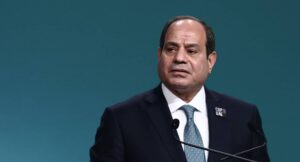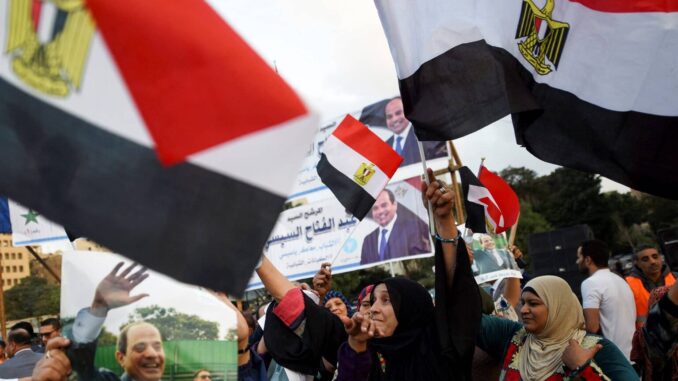By
 President Abd Al-Fattah al-Sisi. Photo credit: Jakub Porzycki via Reuters Connect.
President Abd Al-Fattah al-Sisi. Photo credit: Jakub Porzycki via Reuters Connect.
The grand opening ceremony of Egypt’s new National Museum, reportedly the world’s largest museum space, was postponed. President Abd Al-Fattah al-Sisi had hoped to invite world leaders to gather in Giza outside Cairo, with the Pyramids as the backdrop, and give a boost to both tourism and himself as he begins a third term in office. But the crisis in Gaza put the gala festivities on hold; only a few exhibits of the new museum are currently open to the public. To a large extent, this is a reflection of Egypt’s wider woes.
Tourism is one of Egypt’s main sources of income but following October 7, It has dwindled to a trickle from the Gulf and some European countries, while American, Japanese and other Asian tourists seem to have taken Egypt off their maps. Tourist revenue has been cut to a third of pre-Gaza war levels.
As for the Israelis, they have vanished since the murder of two Israeli tourists by an Egyptian policeman in Alexandria on October 8 2023, a day after the Hamas assault from Gaza. Even the Red Sea shores of Sinai no longer host Israeli revelers, who used to rub shoulders with Saudis, Jordanians and Egyptians in the same tents or hotels along the beach.
Another major source of revenue – Suez Canal transit fees – was shaken in December 2023 as tankers and cargo ships stopped sailing through Bab al-Mandeb towards the Suez Canal. Admiral Ossama Rabiee, the Canal’s CEO, has declared that traffic has not been significantly disrupted, carefully avoiding any mention of passage to Israel and its Mediterranean ports of Ashdod or Haifa. But as the Gaza war continues, the threat posed by the Iranian-backed Houthi regime to Suez Canal revenue will inevitably raise alarms in Cairo and in Egypt’s emerging new (as yet unnamed) capital, where the Defense Ministry – the “Octagon” – is now located. Egypt chose not to join the American-led Operation Prosperity Guardian to protect the Red Sea shipping lanes.
Accompanying the economic problems – which include steep price rises for basic commodities – in late December came a blow to Egypt’s economic prestige at the hands of the Sawiris clan, Coptic Christians who are the country’s wealthiest family and major investors in the economy. Nassef Sawiris, estimated to be worth $7.6 billion, has chosen to leave for Abu Dhabi and run his business empire from there. Another brother, Samekh, took a similar step, going to Saudi Arabia. A third brother, Nagib, was obliged to respond to the anger of the thousands of Egyptian workers, engineers and administrators who may be affected. Many investors, he explained, are afraid to come or stay in Egypt with the Egyptian pound in free fall against the dollar. Meanwhile, Samekh, speaking with the Saudi-owned TV channel al-Arabia, was even more explicit: the future, he said, lies in the Gulf, while Egypt stays behind.
Other troubles lie in regional water diplomacy, most importantly, securing the flow of the Nile River from Ethiopia to Egypt via Sudan. Egypt relies on the Nile for 97 percent of its drinking and irrigation water. The upstream nations are well aware of this existential need. Yet Egypt was forced to announce the failure of bilateral talks in Addis Abeba over the rate of filling up the Ethiopian Renaissance Dam on the Blue Nile. The Ethiopians, anonymous Egyptian officials alleged, are playing a dangerous game, while Egypt and Sudan (now torn by internal strife) insist on the continuous provision of Blue Nile waters downstream. Back in September 2023, Ethiopian Prime Minister Abiy Ahmed announced the success of the fourth stage of filling up the dam lake, which Cairo saw as a blatant breach of Ethiopian obligations to maintain the river’s flow. Hence the warning by Egypt’s Foreign Minister, Samekh Shukri, that it would be a mistake to assume that Egypt can accept a situation in which the lives of one hundred million Egyptians would be endangered by the lack of drinking water.
Left to face the consequences of this economic and diplomatic deterioration is a regime dominated by two figures. Standing side by side are President Abd al-Fattah al-Sisi, 69 years of age, who served as defense minister in the Muslim Brotherhood government of President Muhammad Mursi until he overthrew it on July 3, 2013, and Major General Abbas Kamel, now 66, the head of Egypt’s external intelligence service. The latter began his career as an attache in Prague, went on to become the Chef du Cabinet to the Commander in Chief of the Army, and later Chief of Staff of the Presidency before assuming his present position.
Effective repression of dissent is certainly part of the regime’s strategy for survival. While allowing symbolic “contenders” to run against him, Sisi won a third of office in December 2023 with a massive vote of nearly 90 percent – signaling that he intends to perpetuate his hold on power. He has also taken increasingly stern measures against what he considers subversive elements. Viewing more than 60,000 political prisoners in Egypt’s jails, the American administration has become more vocal in its criticism of human rights abuses.

Anyone suspected of Islamist activism, as well as other critics of the regime such as the activist and former journalist Hisham Qassem, end up being arrested. A leader of the liberal opposition “Free Movement” was detained – to his surprise – in August 2023 , despite having confidently told his friends that the regime would not dare to touch him. Independent media in Cairo report a situation of over-crowded prisons, with detainees awaiting trial and those sentenced for long years mingling in the halls.
Israeli officials have never taken up the American practice of criticizing Sisi on human rights issues. According to a senior Israeli official deeply involved in monitoring developments in Egypt, this discretion makes it possible to work closely with Cairo. “We are engaged with current security in Sinai”, he said, “and we are in dialogue with Egypt over the future of Gaza. As I see it, they have a profound understanding of the situation, but we need to be aware of the doublespeak: what they would say in the public domain will not be similar to what we hear face to face.”
For both Sisi and Kamel, this involvement in Gaza is one of the keys to restoring Egypt’s regional standing. They did what they could, according to press reports in Israel and Washington, to prevent the outbreak of violence on October 7. The Israeli media reported that shortly before October 7 a senior Egyptian intelligence officer, perhaps Kamel himself, warned either Prime Minister Binyamin Netanyahu or a senior figure close to him that highly unusual activities were unfolding in Gaza close to the border with Israel. The warning was rebuffed, presumably because the Israeli side felt that things were under control and there were pressing needs elsewhere. The Egyptian then felt obliged to alert the Americans, as reported by House of Representatives Foreign Affairs Committee Chairman Michael McCaul, that serious events may be about to happen, again, shortly before the attack on October 7. Prime Minister Netanyahu has publicly denied these reports.
Abbas Kamel has won the respect of Israelis who have worked with him, including Netanyahu and former Defense Minister (now war cabinet member) Benny Gantz. They see Kamel seeking solutions to the key dilemmas the war is posing. These include the need for humanitarian pauses, the supply of food and medications through the Rafah border crossing, and above all, the exchange of Israeli hostages for Palestinian prisoners. He is reportedly able to speak directly over a landline (in a tunnel) with Hamas leader Yahia Sinwar. His office in the Heliopolis quarter of Cairo has hosted the heads of the Mossad, Shin Bet, Hamas and Palestinian Islamic Jihad. Egypt put a plan on the table for the gradual resolution of the hostage crisis, and an ultimate end to the fighting. Hamas rejected it, while the Israeli cabinet (which publicly refuses to accept any outcome that does not involve the collapse of Hamas rule in Gaza) nevertheless gave it a serious hearing.
Egypt’s interests, as perceived by its leaders, often seem to cohere with those of Israel. But this is not how it looks to many Egyptians, including the men and women of letters who comprise Cairo’s self-identified intelligentsia.
Alaa al-Aswani is a leading member of the intelligentsia. He made his name in 2002 with a surprise bestseller, The Yacoubian Building, and has added four more novels since. Aswani deliberately avoids contact with Israelis. Nine years ago he fled from Egypt. A heavy hint from the security forces led him to pack up, close his dental practice and take his wife and children with him – first to Paris and then to the United States. From there he writes a weekly post replete with stinging criticism of the regime, the military and the security forces, and recently engaged in a sharp verbal attack on President Sisi on a widely-viewed YouTube video He is unlikely to return to Egypt anytime soon.
Aswani is rumored to seek the Nobel Prize for literature. The only other Arab winner of this prize, Nagib Mahfouz in 1988, brought Egypt a great deal of pride and honor. Mahfouz supported Sadat’s peace initiative and opened his office on the fourth floor of the al-Ahram building to visiting Israelis; indeed, it was an Israeli scholar, the late Sasson Somekh, who promoted Mahfouz’s candidacy with the Nobel committee. Aswani, on the other hand, rejects any Israeli attempt to reach out to him (although his books did come out in Hebrew). He did not consent to an interview with my daily paper, Yediot Aharonot. He insisted that a go-between in Britain would send him my questions and he would answer only to that go-between.
Aswani is not alone. Another Egyptian novelist who consented to have her book translated into Hebrew withdrew her consent at the last moment for fear (with good reason) that she would be kicked out of the Egyptian writers’ guild.
Egypt’s professional guilds and unions are traditional strongholds of anti-normalization with Israel (and used to be Muslim Brotherhood strongholds as well). The unions of film producers, actors, directors, as well as those of doctors, lawyers, engineers, pharmacists and even the union of the bawwabs (doormen in office and residential buildings), all ostracize those who have contact with Israel.
This may be irrelevant to state policy as long as Sisi and his regime sees merit in the Israel relationship. But should the country’s troubles deepen further, undermining political stability, views in the intelligentsia and the professions could have a dangerous impact on the peace that has held until now for 45 years.



Leave a Reply
You must be logged in to post a comment.